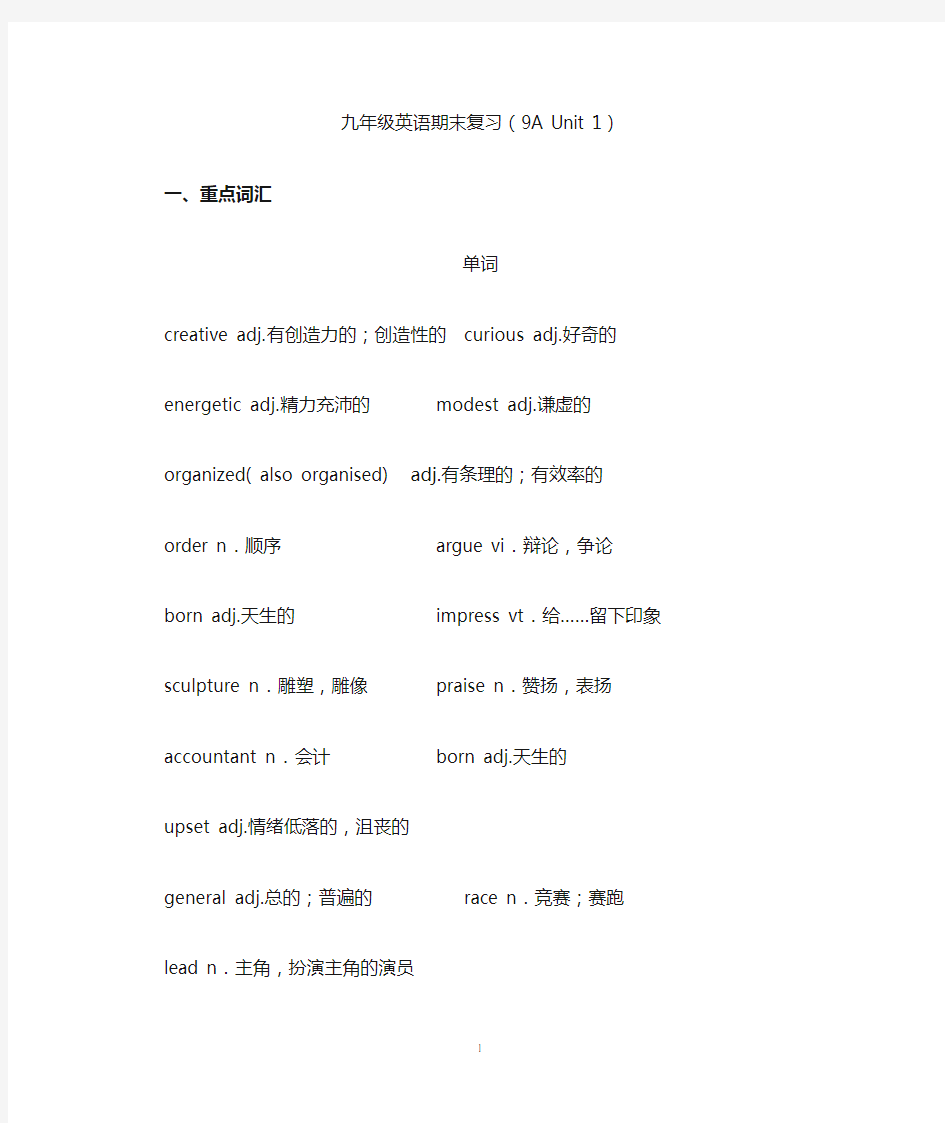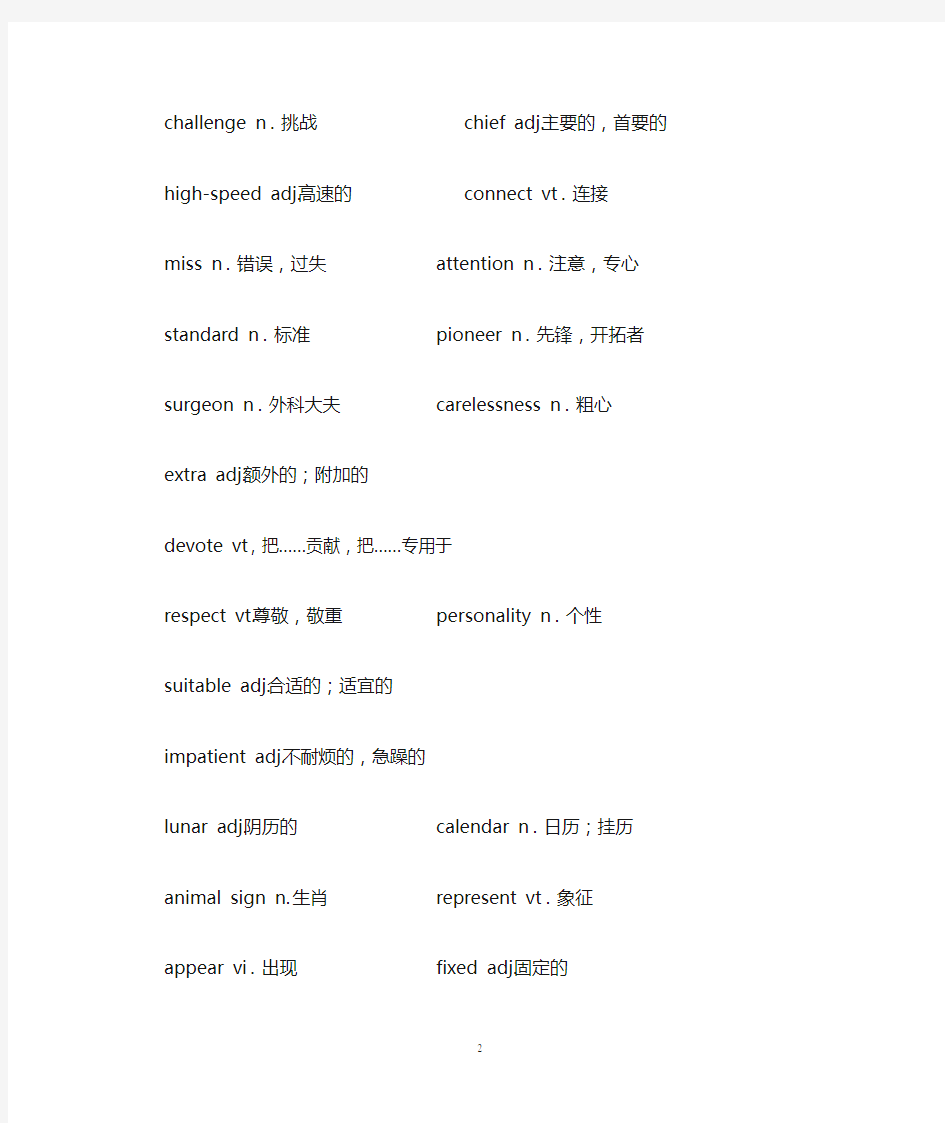

九年级英语期末复习(9A Unit 1)
一、重点词汇
单词
creative adj.有创造力的;创造性的curious adj.好奇的
energetic adj.精力充沛的modest adj.谦虚的
organized( also organised) adj.有条理的;有效率的
order n.顺序argue vi.辩论,争论
born adj.天生的impress vt.给……留下印象sculpture n.雕塑,雕像praise n.赞扬,表扬
accountant n.会计born adj.天生的
upset adj.情绪低落的,沮丧的
general adj.总的;普遍的race n.竞赛;赛跑
lead n.主角,扮演主角的演员
challenge n.挑战chief adj.主要的,首要的
high-speed adj.高速的connect vt.连接
miss n.错误,过失attention n.注意,专心
standard n.标准pioneer n.先锋,开拓者surgeon n.外科大夫carelessness n.粗心
extra adj.额外的;附加的
devote vt,把……贡献,把……专用于
respect vt.尊敬,敬重personality n.个性
suitable adj.合适的;适宜的
impatient adj.不耐烦的,急躁的
lunar adj.阴历的calendar n.日历;挂历
animal sign n. 生肖represent vt.象征
appear vi.出现fixed adj.固定的
cycle v.循环powerful adj.有力的;强大的
lively adj.活泼的;生气勃勃的
practical adj.实际的loyal adj.忠诚的
mood n.心情,情绪divide vi.& vt.分开,分
shape vt.使成形,塑造speech n.演说,讲话,发言monitor n.班长position n,职位
词组
1.share... with与某人分享2.eat up吃光
3.keep in good order按照顺序放好
4.show off炫耀
5.explain.…to向某人解释……
6.come up with想出(主意);追上,赶上
7.be curious about对……感到好奇
8.argue with与某人争吵
9.either... or不是……就是;或者……或者
10. neither... nor既不……也不……
11.a born artist 一个天生的艺术家
12. win high praise from 赢得高度赞扬
13. search for寻找14. give up放弃
15. sales department销售部16. work with与谁工作
17.take the lead处于领先地位18. fall behind落后
19. connect to/with与……相连,连接
20. as good as和……几乎一样,简直是
21. pay attention to关注
22. be willing to乐意23. in fact事实上
24.devote... to将……奉献给……
25. be known for因为……而出名
26. take part in参加27. animal sign生肖
28. depend on依赖于,取决于29. star sign星座.
30.divid e…into将……分成……
31. agree with sb同意(某人)看法
二、重要句型
1. It makes them feel good to share things with others.与别人分享东西使他们感到开心。
make sb do sth“使某人做某事”,后接动词原形,用于被动语态时,使用be made to do sth。
My good friend often makes me laugh when I am sad.
当我伤心时,我的好朋友常常能使我笑起来。
2.Mr Wu is patient enough to spend a lot of time explaining things to us.吴老师足够耐心地花费很多时间同我们解释东西。
(1)enough形容词或者副词,意为“足够的;足够地”。当修饰名词时,放在名词前;当修饰副词或者形容词时,放在副词或者形容词之后。如:
I don't have enough money for a new house.
我没有足够的钱买新房子。
I'm not old enough for my bus pass yet!
我还不到领取免费乘车票的年龄。
(2) spend动词,意为“花(钱、时间);花费;度过”。常
用搭配:spend…on sth花费……在……方面
spend.…(in) doing sth花费……做……
I spend the whole day doing the housework.
我花了一整天的时间做家务。
3.It's terrible for me to work without any words all day long.对我来说,整天只工作不说话很糟糕。
It is+ adj. +for/of sb to do sth
(1)for sb常用于表示事物的特征特点,表示客观形式
的形容词,如easy,hard,difficult,interesting,important,impossible等,不能表示某人的特征:
It's very hard for him to study two languages.
对他来说,学两门外语是很难的。
(2) of sb的句型一般用表示人物的性格,品德,表示主观感情或态度的形容词,如good,kind,nice,clever,foolish,right。
It's very nice of you to help me.
你来帮助我,你真是太好了。
4. Life is like a race. You either take the lead or fall behind.人生就像一场赛跑,你要么领先,要么落后。
句中的take the lead和fall behind是一组反义词,用在此处正好形成对比。take the lead 意为“领跑”;fall behind意为“落后”。
If you fall behind, don't give up.
如果你落后了,不要放弃。
5.To us, miss is as good as a mile. We can't afford to make any mistakes.对我们来说,失之毫厘,谬以千里。我们承担不起任何错误所造成的后果。
(1)句中的a miss is as good as a mile是英语谚语。其中as good as意为“几乎一样;简直是”,as…as表示同级的对比,中间接形容词的原级。如:
This book is as good as that one.
这本书和那本一样好。
My family is as good as yours.
我们家和你家一样。
(2) make mistakes意为“犯错”。如:
Don't worry. Everyone may make mistakes.
别担心。每个人都可能犯错。
6. All of us know that it's necessary to pay attention to every detail,我们都知道关注每一个细节是必要的。
pay attention to意为“注意”,后接名词、代词或者动名词作宾语。如:
He paid attention to making little noise.
他注意不发出噪声。
7.As a doctor,you can't be too careful.作为一个医生,再怎么仔细也不为过。
句中的cannot…too…是常用表达,意思是“无论怎样……也不算过分,越……越”。如:You can't praise the film too much.
这部电影值得大加称赞。
有时也可用can never,impossible等与too连用来表示类似意思。如:
A kid can never have too many toys.
孩子永远也不会嫌玩具多。
It's impossible to get there as early as possible.
去那儿越早越好。
8. Each of them represents a lunar year. They appear in a fixed order and the cycle repeats every 12 years.其中的每一种动物代表一个阴历年份它们,顺序固定,而且这一循环每12年往复一次。
句中的every意思是“每,每隔”,表示事物发生的频率。every two days应译作“每2天”或者“每隔1天”,如:
The buses go every 20 minutes.
公交车每隔20分钟发一班车。
1 go to see my grandmother every two weeks.
每隔一周我去看一次奶奶。
9. In Western countries, the year is divided into a cycle of 12 star signs.在西方国家,一年被分为12个星座的循环。
divide…into…意为“把……划分为……”。
The English teacher divided the class into groups.
英语老师把班级分成小组。
be divided into.,,被分成……(为被动语态结构)
The students were divided into four groups.
学生们被分成四组。
10.It is you who shape your life and your future.你的生活和你的未来都掌握在你的手中。
句中“It is+被强调的部分+who/that+原句其他部分”是一种强调句型,用于加强语气。
It is the book that interests me most.
就是这本书最使我感兴趣。
It is MH 370 that caused all the world's heart.
马航370牵动着世界人民的心。
三、核心语法
A and,but,or和so的用法
【一语击破】
A.and的用法:
and可以连接语法作用相同的词、短语或句子,表示并列或对称的关系,可翻译为“和”、“并”、“又”、“兼”等。
1)连接两个并列主语。如:
Millie and Amy go to the park every week.
Millie和Amy每周都去公园。
2)连接两个并列谓语。如:
You must take care of yourself and keep healthy.
你必须照顾你自己并保持健康。
3)连接两个简单句。如:
They love playing football and we love playing football, too.他们喜欢踢足球,我们也喜欢踢足球。
【友情提醒】
①如果连接两个或两个以上的词语,通常把and放在最后一个词语前面;为了强调,可在两者之间分别加上and;把词语连接起来时,通常把较短的词语放在前面。如:
I like eggs, meat, rice, noodles and dumplings.
我喜欢鸡蛋、肉、米饭、面条和饺子。
②但是有些用and连接的词语,顺序是固定的,不能随意改变。如:
men,women and children男人、妇女和儿童
fish and chips炸鱼加炸土豆片
B.but的用法:
but在英语中常用作连词。用来连接词与词、词组与词组或句子与句子、表示某种逻辑关系(并列、从属、转折、因果等)。
一般而言,凡是用but连接的两个内容,其意义是相反的,如果不带有相反的意义,则不能用but,而要用and。如:
They are tired but happy.他们很累但挺高兴。
He is poor but honest.
他很穷但非常诚实。
I was going to write, but I lost your address.
我想给你写信,但是忘记了你的地址。
C.or的用法:
表示选择,意为“或”、“还是”。一般用于选择疑问句或者否定句中。如:
Is the radio off or on? 收音机关上了还是开着的?
Would you prefer tea or coffee?
你喜欢茶还是咖啡?
We don't know whether he's alive or dead.
我们不知道他是死是活。
D.so的用法:
表示因果关系,意为“所以”。so作连词用,意为“因而”、“所以”、“为了”、“以便”等。如:
Wang Tao's pen was broken, so he needed a new one.
王涛的钢笔坏了,所以他需要买支新的。
【友情提醒】
用英语表达“因为……,所以……”时,用了because就不能再用so,用了so就不能再用because。
B both…and…,not only…but also…, either…or….和neither…nor…的用法
【一语击破】
【友情提醒】在解答这几个连词的辨析题时,应根据句意,来选择,同时兼顾主谓一致。
四、考点精讲
一、核心词汇
1.neither det & pron.
[考点点拨] neither有多种词性:
(1) neither用作代词时意为“两者都不”,常用于neither of的结构,neither of…作主语时,通常被视为单数,但从意义上来讲也可视为复数,因此其谓语动词既可以用单数也可以用复数。如:
Neither of the cars was/were damaged.
两部车都没有受损。
He answered neither of the letters.
他两封信都没回。
(2) neither用作形容词时,意为“(两者之中)均无的,两者皆非的”,放在单数名词之前,修饰名词。如:
Neither article is made in Beijing.
这两个物品都不是在北京制造的。
(3) neither用作连词时,常用短语为neither…nor…,意为“既不……也不……”。如:
I have neither time nor money.
我既没时间也没钱。
(4) neither用作副词时,意为“也不”。此时应该放在句首,表示前面否定的内容也适用于另一个人或物,句子采用倒装结构,此时也可用nor替换neither。如:
-I don't like this dress.
我不喜欢这件连衣裙。
- Neither/Nor do I.
我也不喜欢。
2.born adj.
[考点点拨- born用作形容词时,意为“天生的”,常用作定语。如:
The mother gazed with love at her new born baby.
母亲充满爱地凝视着她刚出生的婴儿。
His father is a born writer.
他爸爸是一位天生的作家。
born还可以是动词bear(生,生育)的过去分词,意为“出生”。如:
I was born in a small city near Guangzhou.
我出生在离广州不远的一个小城市。
3.attention n.
[考点点拨] attention意为“注意,专心”,是不可数名词,不能与不定冠词连用,没有复数形式。pay attention to,give attention to,bring attention to中的to是介词,后面跟名词、代词或动名词;attract/catch one's attention吸引/抓住某人的注意力。如:
You must pay close attention to his eyes.
你必须密切关注他的眼睛。
关于attention的常用口语有:
May/Could I have your attention, please?
请各位注意。
Attention,please.
请注意。
Thank you for your attention
谢谢。(发言/演讲结束时用)
二、核心句型
1. Samuel is creative. He often comes up with new ideas.
塞缪尔富有创造力。他经常想出新点子。
[考点点拨] come up with想出,提出。如:
She came up with a new suggestion to solve the problem.
她提出了一个解决这个问题的新建议。
2. I'm ready to take on new challenges any time.
我随时准备接受新的挑战。
[考点点拨] take on在本句中意为“接受”,take on challenges接受挑战。如:
No one would like to take on this challenge.
没有人愿意接受这项挑战。
三、重点语法
1.连词and,but,or和so的用法
英语中,连词是连接单词、短语或者句子的一种虚词,在句中不单独作任何成分。按照性质,连词可以分为并列连词和从属连词。由并列连词连接的两个(或两个以上)简单句叫作并列句,由从属连词连接的句子叫作复合句。并列连词可以用来表示并列关系、转折关系、选择关系或因果关系等。
(1) and意为“和,又”,用来连接两个语法意义上相同的词、短语或句子,表示并列或附加关系。如:
English and Chinese are different languages.
英语与汉语是不同的语言。
如果连接的两个句子主语相同,and后就不必重复第一个主语。如:
We saw the tower and(省略we) liked it very much.
我们看到了塔并非常喜欢它。
如果连接的两个句子主语和动词相同,and后就不必重复前面的主语和动词。如:
He felt cold and(省略he felt) hungry.
他感到既冷又饿。、
(2) but意为“但是,然而,却”,可用来连接两个有对立或对照性关系的词、短语或句子,表示一种转折关系。如:
He likes singing, but his sister likes dancing.
他喜欢唱歌,但他妹妹喜欢跳舞。
(3) or意为“或者,还是”,表示一种选择关系。如:
Are you coming or not?
你来不来?
or如果连接两个主语时,谓语动词的单、复数形式与
or后面的主语保持一致,即遵循“就近原则”。如:
James or Helen is going to tell us a story.
詹姆斯或海伦将会给我们讲故事。
(4) so意为“因此,所以”,常用来连接两个简单句,这两个简单句有意思上的因果关系。如:
The rain began to fall, so we went home.
雨开始下了,所以我们就回家了。
so和从属连词because(因为)不能一起连用。也就是说,使用了并列连词so,就不能用从属连词because; 使用了because,就不用so。如:
He was ill, so he didn't go to school.
=He didn't go to school because he was ill.
他病了,没去上学。
2. both…and…, not only…but (also)…, either…
or…和neither…nor…的用法
(1)both…and…意为“……和……(两者)都……”,可以连接句子中任意两个对等的成分。在连接主语时,谓语动词用复数形式。如:
Both Millie and Kate are good at English
米莉和凯特都擅长英语。
(2) not only…but (also)…不但……而且……,是并列连词,在句中可连接相同的成分。连接主语时,谓语动词应和最近的主语保持一致,即遵循“就近原则”。用法类似的有: either…or…或者……或者……;neither…nor…既不……也不……如:
Not only the students but also the teacher likes the film
不仅是学生,而且老师也喜欢这部电影。(连接主语)
She not only sings well but also dances well.
她不但唱得好而且跳得也好。(连接谓语)
He plays not only the violin but also the piano.
他不但拉小提琴而且也弹钢琴。(连接宾语)
Either you or I am wrong.
或者是你错了或者是我错了。
Neither you nor I am wrong.
你和我都没有错。
考点精练
一、单项选择
( )1. (2014.青岛)Peter can play the guitar, _______ he can't play it very well.
A.because B.so C and D but
( )2. (2014.南通)You can join the Reading Club _______ you can go to the Dancing Club.
Either is OK.
A.and B or C but D.so
( )3. (2014.滨州) - How do you like the two pairs of shorts?
- They don't fit me well. They are_______ too long_______ too short.
A. not only; but also B both; and
C neither; nor D. either; or
( )4. (2014.广州) -Would you like tea or coffee?
- _______, thanks! I'd prefer a coke.
A Both
B Neither C.All D Some
( )5. (2014.菏泽)"Learning from Lei Feng Day" is only two weeks from now. We need to_______ a plan about it.
A.come up with B.put up
C.call up D.set up
( )6. When you visit a museum, you should _______ the instructions and don't be against
them.
A. compare with
B. look forward to
C pay attention to D. try out
二、用所给动词的适当形式填空
1. Both Alice and Mike_______ (be) going to the zoo next Sunday.
2. Not only the twins but also Millie_______ (dance) very well.
3.I think Millie is a_______ (bear) monitor.
三、根据汉语提示完成句子
1.(2014.黄石)我感到很惊讶,我和戴维都未受邀参加这个晚会。
I felt surprised that _______ David_______ I was invited to take part in the evening. 2.(2014.北京)咱们选迈克当班长怎么样?他不仅诚实,而且守信。
Shall we make Mike our monitor? He is _______.
3.你应该足够勇敢,接受任何挑战。
You should be brave enough______________.
参考答案
一、1—6 DBDBA C
二、1.are 2.dances 3.born
三、1. neither; nor 2.not only honest but can also keep his word 3. to take on any challenge